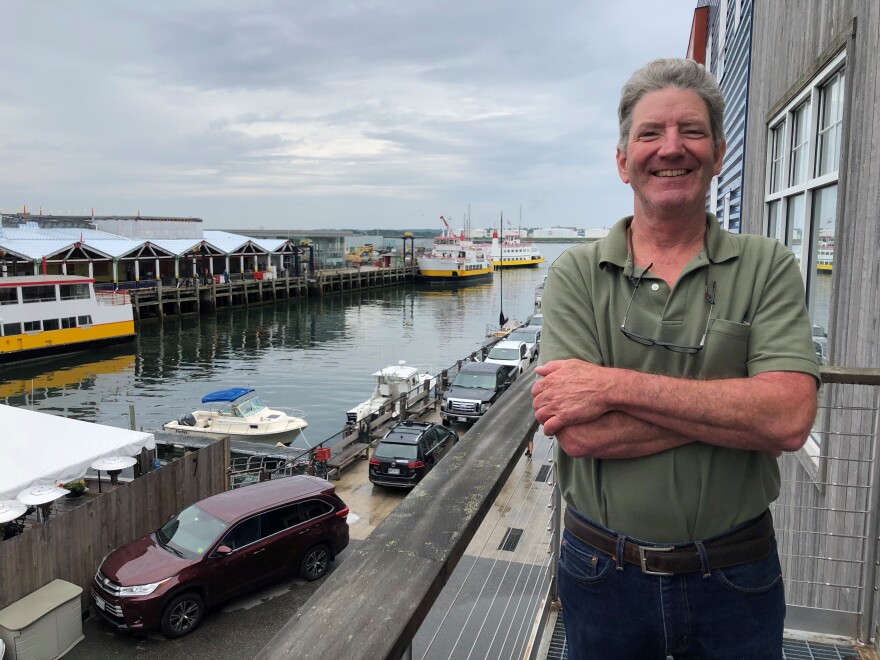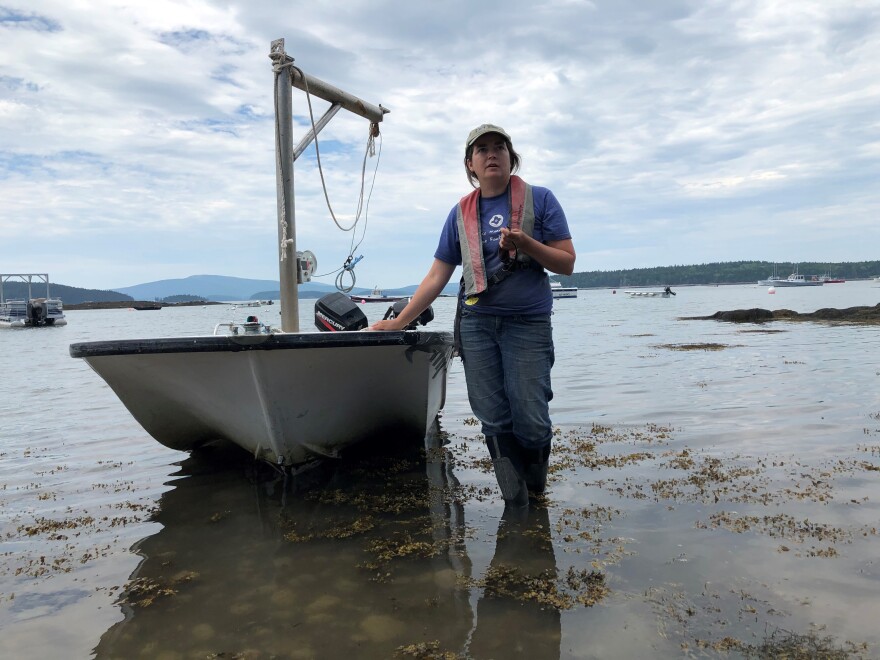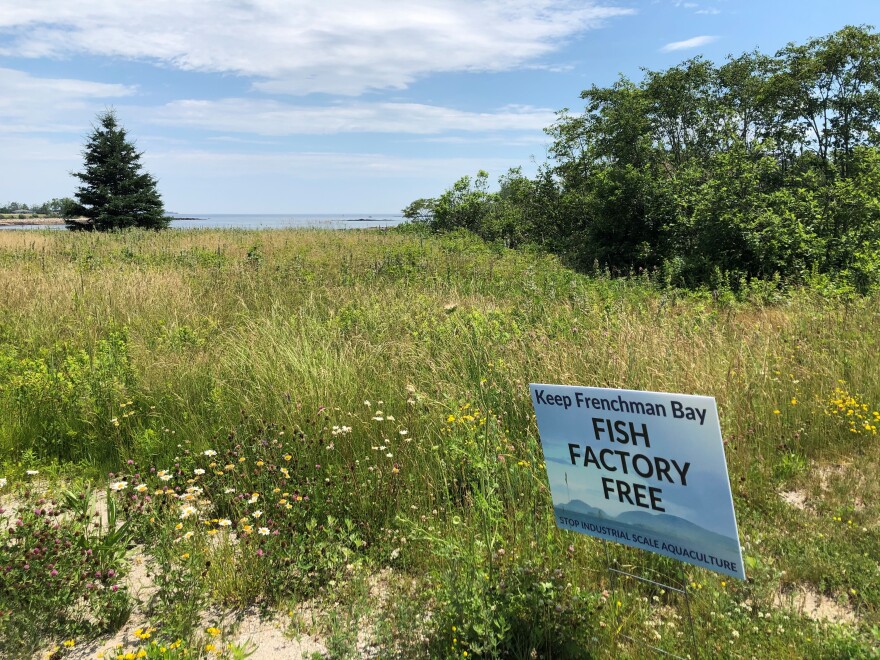A Norwegian investor wants to bring a new kind of fish farm to a stunning, island-studded bay at the base of Acadia’s famous Cadillac Mountain. The project is uniting broad opposition in and around tourist-dependent Mt. Desert Island.
The "American Aquafarms" project is the latest in a series of industrial-scale fish farms proposed for Maine, highlighting how the nation’s demand for seafood is putting pressure on local marine economies.
Frenchman Bay reaches from the eastern side of Mt. Desert Island to the Schoodic peninsula. Through the 20th century, sardine canneries dotted the bay. But the last of them, in Gouldsboro, shut down more than a decade ago.
"Sardines, and the herring fishery was the biggest fishery for 50 or 60 years and then that declined. But now the only thing left is small fisheries - scallops and all of that. Lobster's the only viable industry," says Dana Rice, Gouldbsoro's selectman.

Fred Bever
Here at Gouldbsoro's town office, Rice is also the harbormaster and a lobster dealer. He says even the lobster processing company that took over the old harbor sardine plant has had a hard time making it, and waterfront jobs have dwindled. So when a Norwegian investor started sounding out local officials about converting it into a fish hatchery and processing facility for an at-sea salmon farm, Rice was interested.
"I would like to see some good paying jobs for the younger generation... this intrigued me. Hey, they're talking somewhere between $150 million and $350 million investment, you can't turn your back on that. You can not," Rice says.
American Aquafarms optioned the property two years ago, and since has been laying groundwork for what its backers say will be a state-of-the-art "closed-pen" system: an array of enclosed, floating capsules, full of fish, that ostensibly would avoid most of the negative impacts of traditional open-pen salmon farms, such as escapes, disease and pollution.
All that while growing as much as 30,000 metric tons of fish a year, enough to serve 5% of the combined U.S. and Canadian markets for Atlantic salmon.

Fred Bever
"We're going to need more food production in the future. We can contribute a great deal to that in Maine," says Thomas Brennan, American Aquafarms' project development director and a former Poland Spring executive. With American Aquafarms' principles stuck overseas by the pandemic, its de facto man-on-the-ground. He says the venture represents twin benefits: more than a hundred direct jobs and a sustainable way to reduce U.S. dependence on imported seafood, thereby reducing the sector's carbon footprint too.
That's right in line with the state's goals for economic recovery, Brennan says, and for battling climate change. Not to mention preserving an historic piece of Maine's dwindling working waterfront.
"I'm afraid we're losing it. And this provides an opportunity to revitalize and area that otherwise may become condos," Brennan says.
But the project's run into some fiercely-protective citizens and organizations, from conservationists to business owners, who see the bay as a unique and vulnerable resource.
People like Sarah Redmond, who four years ago moved into another defunct fish cannery on the other side of the Gouldsboro peninsula. That's where she and a partner established Springtide Seaweed, the nation's first organically-certified grower of kelp - a pioneer in Maine's fast-growing cadre of independent aquaculture farmers.

Fred Bever
"So we have a seaweed nursery inside the building in the basement, where we can raise seed for our own farm and other farms. And then we have processing and this is our own boat here. It's really, really essential to have access to the seawater here," Redmond says.
Redmond steers her skiff out into the bay. Whizzing past undeveloped islands and lines of lobster buoys, she stops about mid-way between Bar Harbor and Gouldsboro, over a deep channel known locally as "the Hop."
This is the site of one of the two proposed, 60-acre salmon pens.
"We are right at the foot of Acadia National Park. It's just this amazing mountain range that rears up out of the ocean and it's a very, very unique feature on the eastern seaboard. With very little development in this bay, and for the coastline in America and especially in New England, this is very rare," Redmond says.
Redmond says that while the salmon farm's so-called "closed-pen" technology might block most solids - fish poop, that is - from getting into the bay, that's not good enough. They'd still send a big dose of dissolved nitrogen through the pens' permeable membranes, she says, encouraging algal blooms that could harming bay ecosystems, foul her lines and threaten her "organic" brand.
"A tremendous influx of nitrogen in a closed bay like this will really upset the balance in the water," Redmond says.
And Redmond's is just one in a chorus of opposing voices. Conservation groups, project neighbors, local lobstermen and Bar Harbor's tourism industry are all up in arms over various aspects of the project - ecosystem effects yes, but also on-land truck traffic, noise and pollution from on-the water generators, light pollution, odors, navigation hazards posed by the pens and the specialized, hundred-foot boat that would tend them...
And overarching all of those, the impacts on what many see as the bay's most charismatic quality - its sheer visual beauty.
"This is going to be something that's very different looking than anything else in Frenchman Bay, there's no question about that," says Kevin Schneider, director for the region's largest landowner, Acadia National Park. In the last month he's been increasingly vocal about the concerns he has - although stopping short of putting the Park Service on record as an outright opponent.
"In many respects here in Bar Harbor, our product is the scenery, it's the spectacular landscape. And so the views that visitors see as they are driving Park Loop Road or as they're hiking the trail along the north ridge of Cadillac Mountain. How does it impact those views, those roads, those trails, are all historic," Schneider says.
The developers insist that they can mitigate these potential problems and meet all federal, state and local requirements.
These two proposals, and two others as well, were brought to Maine thanks in part, to work by an economic development non-profit that's financed by some of the state's biggest construction and development firms, called Maine & Co. It's coaxed many big employers here, from T-Mobile to Athena Health to WEX, and CEO Peter DelGreco says big fish farms are simply... having a moment.
"Right now internationally people are looking to the U.S. And Maine can make a lot of sense. We've got 3500 miles of coastline, we're within a one-day truck-drive of a hundred million people 130 million people. And 90 percent of our seafood's imported, we are reacting to what investors are doing," DelGreco says.

Fred Bever
Project opponents like seaweed farmer Sarah Redmond say it's an approach to economic development that's out of scale with sustainable resource-based economies.
"People know that the coast of Maine is special, because it's one of the last places that isn't industrialized. So to try to build that kind of a system here, it doesn't make any sense," Redmond says.
And opponents had a setback last week, when state environmental regulators turned back their request that a citizen review board take jurisdiction over the permitting process.
This week Gouldbsboro's board of selectmen voted to seek an independent environmental review of the project. And according to the Ellsworth American, the unanimous vote included the project's heretofore most visible local supporter, Selectman Dana Price.
"fish" - Google News
July 31, 2021 at 05:08AM
https://ift.tt/3ffHp0x
In Acadia's Shadow: Latest Flashpoint in Conflict Over Industrial Fish Farms - Maine Public
"fish" - Google News
https://ift.tt/35JkYuc
https://ift.tt/3feFffJ
Bagikan Berita Ini














0 Response to "In Acadia's Shadow: Latest Flashpoint in Conflict Over Industrial Fish Farms - Maine Public"
Post a Comment